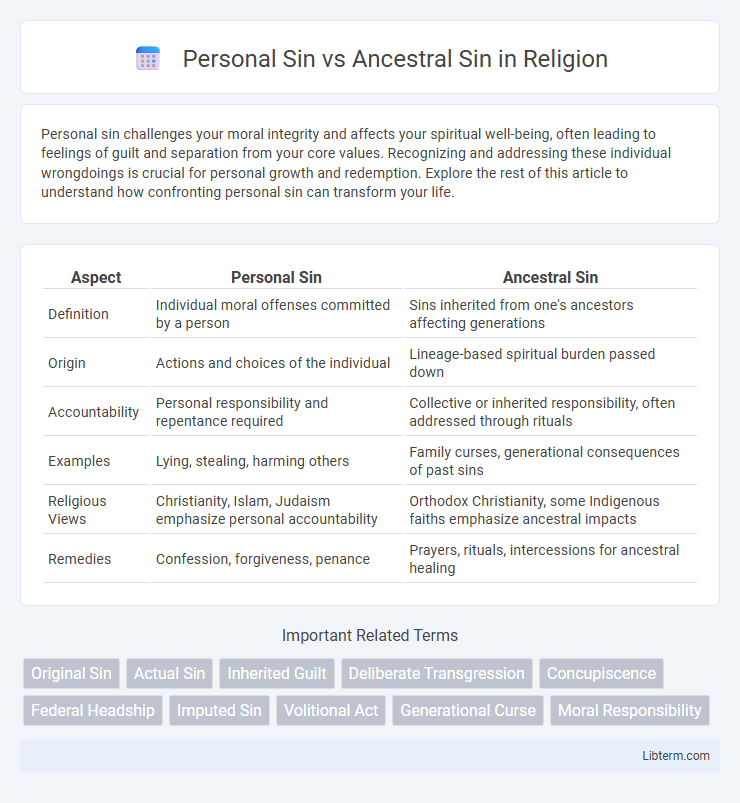Personal sin challenges your moral integrity and affects your spiritual well-being, often leading to feelings of guilt and separation from your core values. Recognizing and addressing these individual wrongdoings is crucial for personal growth and redemption. Explore the rest of this article to understand how confronting personal sin can transform your life.
Table of Comparison
| Aspect | Personal Sin | Ancestral Sin |
|---|---|---|
| Definition | Individual moral offenses committed by a person | Sins inherited from one's ancestors affecting generations |
| Origin | Actions and choices of the individual | Lineage-based spiritual burden passed down |
| Accountability | Personal responsibility and repentance required | Collective or inherited responsibility, often addressed through rituals |
| Examples | Lying, stealing, harming others | Family curses, generational consequences of past sins |
| Religious Views | Christianity, Islam, Judaism emphasize personal accountability | Orthodox Christianity, some Indigenous faiths emphasize ancestral impacts |
| Remedies | Confession, forgiveness, penance | Prayers, rituals, intercessions for ancestral healing |
Defining Personal Sin
Personal sin refers to the individual actions, thoughts, or omissions that violate moral or divine laws, reflecting a person's conscious choice to commit wrongdoing. It contrasts with ancestral sin, which relates to the inherited sinful condition passed down through generations, often rooted in original sin. Personal sin emphasizes individual responsibility and accountability for one's moral failings.
Understanding Ancestral Sin
Ancestral sin refers to the inherited spiritual condition stemming from the original transgression committed by the first humans, often considered Adam and Eve, impacting all their descendants. This concept highlights the collective impact of sin passed through generations, influencing human nature and moral responsibility. Understanding ancestral sin is crucial for grasping how personal sin is not only individual but also linked to a broader spiritual legacy that affects human relationships and salvation.
Biblical Foundations of Personal Sin
Personal sin in the Bible is defined as an individual's conscious and willful transgression against God's commands, as outlined in scriptures such as Romans 3:23, which states, "for all have sinned and fall short of the glory of God." The biblical foundation emphasizes accountability, with Ezekiel 18:20 clarifying that "the son shall not bear the iniquity of the father," highlighting that each person is responsible for their own sins. This contrasts with ancestral sin, which refers to inherited guilt or consequences from one's lineage, a concept more implicit than explicitly defined in scripture.
Scriptural Perspectives on Ancestral Sin
Scriptural perspectives on ancestral sin emphasize the transmission of the consequences of sin across generations, as seen in texts like Exodus 20:5, which speaks of punishing children for the iniquity of their ancestors to the third and fourth generation. Ezekiel 18 challenges this notion by affirming individual responsibility for sin, stating that a son shall not bear the iniquity of the father. Thus, biblical interpretation varies, with some passages highlighting inherited guilt and others underscoring personal accountability for sin.
Theological Differences and Similarities
Personal sin involves an individual's deliberate actions that violate divine law, directly affecting their moral and spiritual state. Ancestral sin, often rooted in theological traditions like Eastern Orthodoxy, emphasizes the inherited fallen nature passed from the first humans, impacting human nature but not counted as individual guilt. Both concepts address humanity's separation from God, yet personal sin highlights individual accountability while ancestral sin underscores a collective, inherited condition requiring divine grace for restoration.
Effects of Personal Sin on the Individual
Personal sin directly impacts the individual's spiritual well-being by creating a barrier between the person and God, leading to guilt, shame, and a troubled conscience. It causes moral and emotional consequences such as loss of inner peace, damaged relationships, and a weakened capacity for love and compassion. The effects can extend to physical health and social interactions, manifesting as stress, isolation, and a distorted sense of self-worth.
Generational Impact of Ancestral Sin
Ancestral sin refers to the inherited spiritual consequences passed down through generations, often influencing family behaviors and patterns across time. This generational impact can manifest in recurring struggles or tendencies affecting descendants, distinct from personal sin which involves the individual's own moral decisions. Understanding ancestral sin highlights how inherited conditions may shape a person's spiritual challenges alongside their personal accountability.
Confession, Repentance, and Forgiveness
Personal sin originates from individual actions and conscience, requiring confession for spiritual cleansing and repentance to restore divine relationship. Ancestral sin, inherited through generations, emphasizes collective responsibility and necessitates intergenerational prayers and rituals alongside personal repentance. Forgiveness in both contexts involves God's grace, received through sincere confession and heartfelt repentance, fostering reconciliation and spiritual renewal.
Contemporary Debates on Sin
Contemporary debates on sin emphasize the distinction between personal sin--individual actions that violate moral laws--and ancestral sin, which refers to the inherited state of sinfulness from previous generations. Theological discussions focus on how personal responsibility intersects with inherited guilt or spiritual legacy, influencing perceptions of moral accountability and redemption. Modern interpretations increasingly explore psychological, cultural, and systemic dimensions of sin, challenging traditional notions of inherited condemnation.
Implications for Faith and Practice
Personal sin pertains to individual actions and choices that separate a believer from God, directly affecting personal conscience and spiritual accountability. Ancestral sin refers to the inherited consequences of humanity's original disobedience, influencing a collective fallen state and the foundational need for redemption. Understanding these distinctions shapes doctrines of salvation, confession, and the role of grace in faith communities.
Personal Sin Infographic

 libterm.com
libterm.com